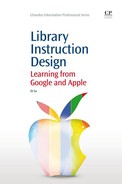Appendix 3
How to Access and Use Library Resources
Library workshop for Speech 101 class (Sample—The Google Style: a one-shot-workshop teaching outline)
■ Learning objectives. The course instructor’s expectation is that after attending the workshop, students will have learned how to access and utilize library resources— online and offline—to gather information for speech presentations.
■ Teaching plan. The librarian’s mission is to help students achieve their goals. The workshop is tailored to learners’ needs. It is a learner-centered instructional activity.
■ Time management. This session (60 minutes) may be divided into three parts:
1. Introduction to library resources (10 minutes)
2. Access to library resources (10 minutes)
3. Use of library resources (40 minutes).
– Hands-on experience is recommended.
– Students are encouraged to ask questions during the session.
– This workshop may be aided with a PowerPoint presentation.
Introduction to library resources
– Use dictionaries for etymology and definitions.
– Use general and specialized encyclopedias for information on various aspects of one subject.
– Encyclopedias are usually arranged alphabetically, like dictionaries.
– Dictionaries and encyclopedias are likely to be in the reference shelf area. Check the catalog for location.
Access to library resources
– Locations of books: reference, reserve, circulation
– Locations of periodicals: journal, magazine, newspaper, microforms.
– on campus: use any computer with Internet access, go to the url for accessing your college library
– off campus: use either a VPN (virtual private network) or an ID barcode (EZproxy); go to the same URL.
– A VPN account is needed for remote access.
– A valid ID is normally needed for entering the library physically, borrowing materials from the library, and using EZproxy remotely.
– It is good to be familiar with both remote access methods because each serves as a backup for the other.
Use of library resources
■ Choose a word or a phrase to be the theme of your speech, consult with the following sources
– Oxford Dictionary of English (OED)
– Subject (specialized) encyclopedias
– Gale Virtual Reference Library.
■ Use various ways to present the word / phrase
– Etymology: word origin, word history
– Synonyms: identical or similar meanings, e.g. Xerox, copy
– Antonyms: opposite meanings, e.g. bright, dark
– Acronyms: abbreviations which are treated as words, e.g. NATO
– Thesaurus: similar meanings, e.g. capital punishment, death penalty, death sentence
– Speeches (Martin Luther King, etc.)
■ Suitable sources for informational language
– Gale Virtual Reference Library.
■ Suitable sources (databases) for persuasive language
– ERIC (Education Resources Information Center, U. S. Department of Education)
– Web of Science (2003–present)
– Literature Resource Center / MLA Bibliography
– Historical Newspapers: The New York Times, 1851–2008.
■ Online catalog search (sample search term: ‘etymology’)
– Subject search: etymology; Language and languages—Etymology
– – Keyword in subject search: etymology
– Keyword in All Fields: etymology
– Keyword Advanced Search: All Fields—etymology, limit to English / book
– Alternative search terms: ‘word origin;’ ‘encyclopedia and [subject].’
– Print version:
Each volume has a List of Abbreviations, Signs, etc.
– Online:
Online version advantages include (1) automatic citation (although no APA style); (2) useful hyperlinks; (3) frequency of updates, e.g. contains ‘Google’ (as a verb).
Tip: Keep two windows open, one for search, the other, Abbreviations page (Under ‘Useful Resources’).
– Use the E-books Title list to find specialized encyclopedias.
– Use Merriam-Webster’s Collegiate Dictionary to find definitions.
– Hyperlink to OED definitions.
■ General Encyclopedia (Print)
– The New Encyclopædia Britannica
– Academic American Encyclopedia (Grolier).
■ Specialized Encyclopedia: keyword search: ‘encyclopedia and [subject]’
For example, ‘encyclopedia and philosophy’.
